Is Gatorade a Sports Drink or an Energy Drink? The Clear Difference Explained
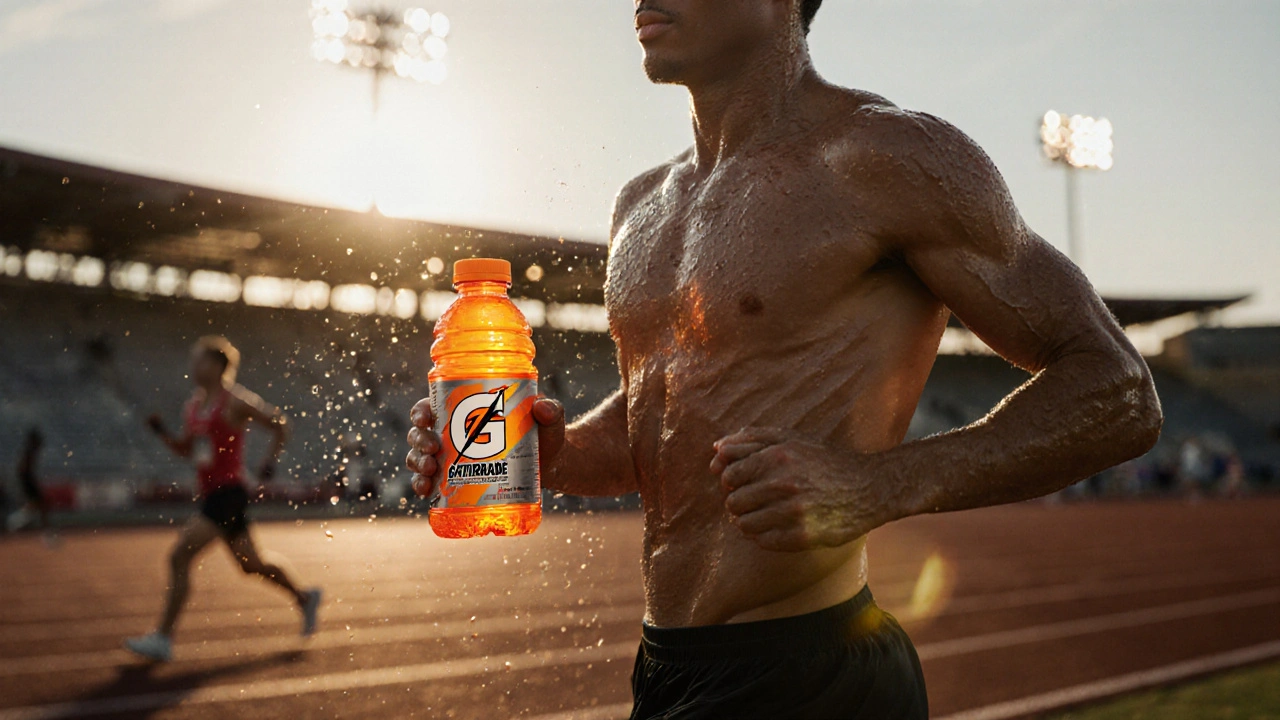
When you grab a bottle of Gatorade after a workout, are you reaching for a sports drink or an energy drink? It’s a question that pops up more often than you’d think. You see the bright orange bottle, the bold branding, the sugar and caffeine on the label - and suddenly, it feels like it should be in the same aisle as Red Bull or Monster. But it’s not. And understanding why matters - especially if you’re trying to fuel your body right.
What Makes a Drink a Sports Drink?
A sports drink isn’t just something athletes drink. It’s defined by what’s inside. The three core ingredients are water, carbohydrates (usually sugar), and electrolytes - mainly sodium and potassium. These aren’t random additives. They’re there to replace what your body loses during physical activity.
When you sweat, you lose more than just water. You lose sodium, potassium, magnesium, and chloride. These electrolytes help your muscles contract, your nerves fire, and your heart beat regularly. If you lose too much, you get cramps, dizziness, or even heat exhaustion. That’s where Gatorade steps in. It was developed in 1965 by researchers at the University of Florida to help football players stay hydrated during intense heat. The original formula had 6% sugar and 110mg of sodium per 8 oz serving. That’s not a coincidence. That’s science.
Modern Gatorade still follows this formula. A 20 oz bottle contains about 34 grams of sugar and 270mg of sodium. That’s designed to match the body’s needs during prolonged exercise - not to give you a quick buzz.
What Defines an Energy Drink?
Energy drinks are built for a different purpose: to stimulate your nervous system. Their main active ingredients are caffeine, sugar, and often other stimulants like taurine, guarana, or B-vitamins. Their goal isn’t hydration - it’s alertness.
Take Monster Energy. A 16 oz can has 160mg of caffeine - more than a cup of coffee - and 54 grams of sugar. That’s not meant to replace sweat. It’s meant to wake you up. The sugar here is there to mask the bitter taste of caffeine, not to fuel muscles. Some energy drinks even have less sodium than bottled water.
And here’s the key difference: energy drinks often contain ingredients that aren’t approved for regular use during sports. The FDA doesn’t regulate energy drink labels the same way it does sports drinks. That means you might find untested compounds like synephrine or high-dose B-vitamins that can raise your heart rate or blood pressure - not helpful when you’re already pushing your body.
Why People Get Confused
So why does Gatorade feel like an energy drink? Because it tastes sweet. Because it’s marketed with athletes. Because you see it in gyms and on TV during sports events. But marketing doesn’t change chemistry.
Many people think sugar = energy = performance. That’s partially true - sugar does fuel your muscles. But not all sugar serves the same purpose. In Gatorade, sugar is a slow-release fuel. In Red Bull, sugar is a quick spike followed by a crash. The difference is in the context: one is designed for endurance, the other for stimulation.
Also, some newer versions of Gatorade - like Gatorade Zero or Gatorade G2 - have reduced sugar and added artificial sweeteners. That’s not making them energy drinks. It’s making them lower-calorie sports drinks. Still no caffeine. Still no stimulants. Still no energy drink formula.
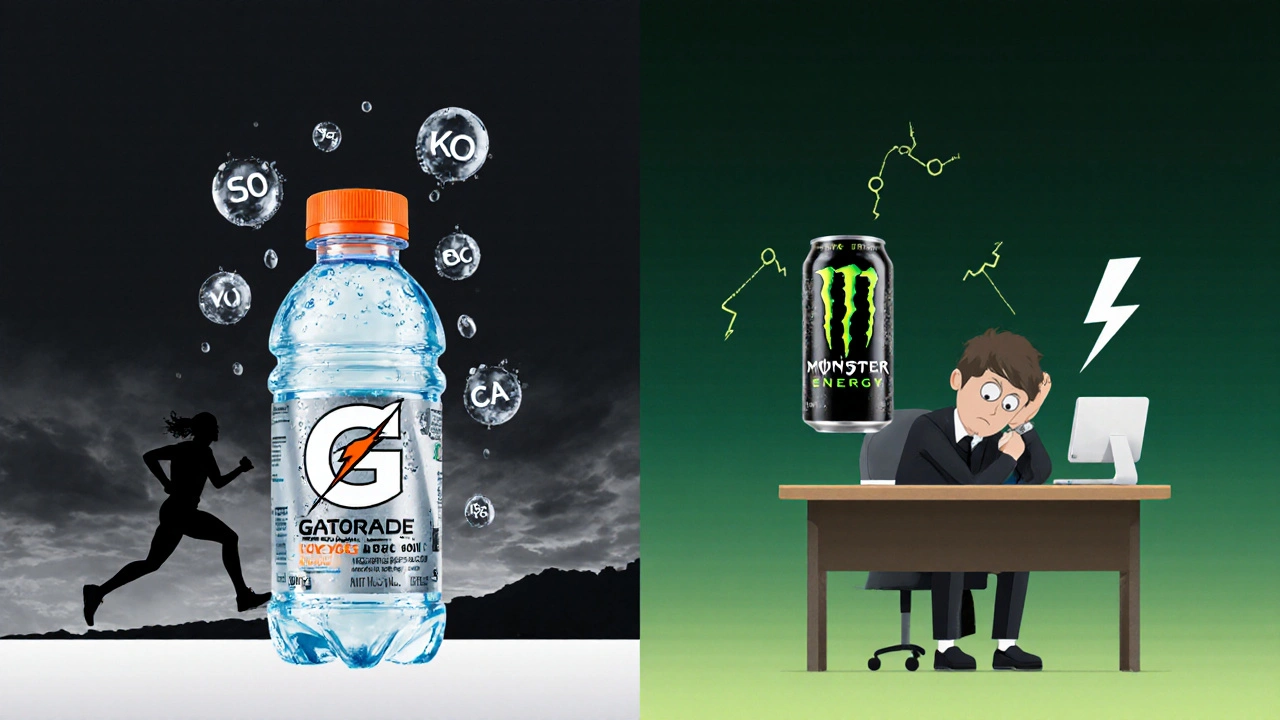
What Happens When You Use Them Wrong?
Drinking Gatorade when you’re not active? You’re just consuming extra sugar. A 20 oz bottle has about 130 calories - mostly from sugar. If you’re sitting at a desk, that’s extra calories with no benefit. Over time, that can contribute to weight gain or insulin resistance.
Drinking an energy drink before a workout? You’re asking your heart to work harder while your body is already under stress. Studies from the American Heart Association show that combining caffeine and intense physical activity can increase the risk of irregular heart rhythms, especially in younger people with no prior conditions.
And if you’re trying to rehydrate after a run but reach for an energy drink instead? You’re missing the point. Energy drinks have little to no sodium. They don’t replace electrolytes. You might feel wired, but you’ll still be dehydrated.
When to Drink Gatorade - and When Not To
Here’s a simple rule: drink Gatorade if you’ve been exercising for more than 60 minutes at a moderate to high intensity - especially in heat or humidity.
- Best for: Long runs, soccer matches, cycling, HIIT sessions, outdoor training in summer
- Not needed for: Short walks, light yoga, gym sessions under 45 minutes, casual bike rides
If you’re just working out for 30 minutes to lose weight or stay active, water is enough. You don’t need the sugar. You don’t need the sodium. Your body isn’t losing enough to warrant it.
And if you’re trying to stay awake during a late-night study session? Don’t reach for Gatorade. It won’t help. Go for tea, coffee, or a short walk instead.
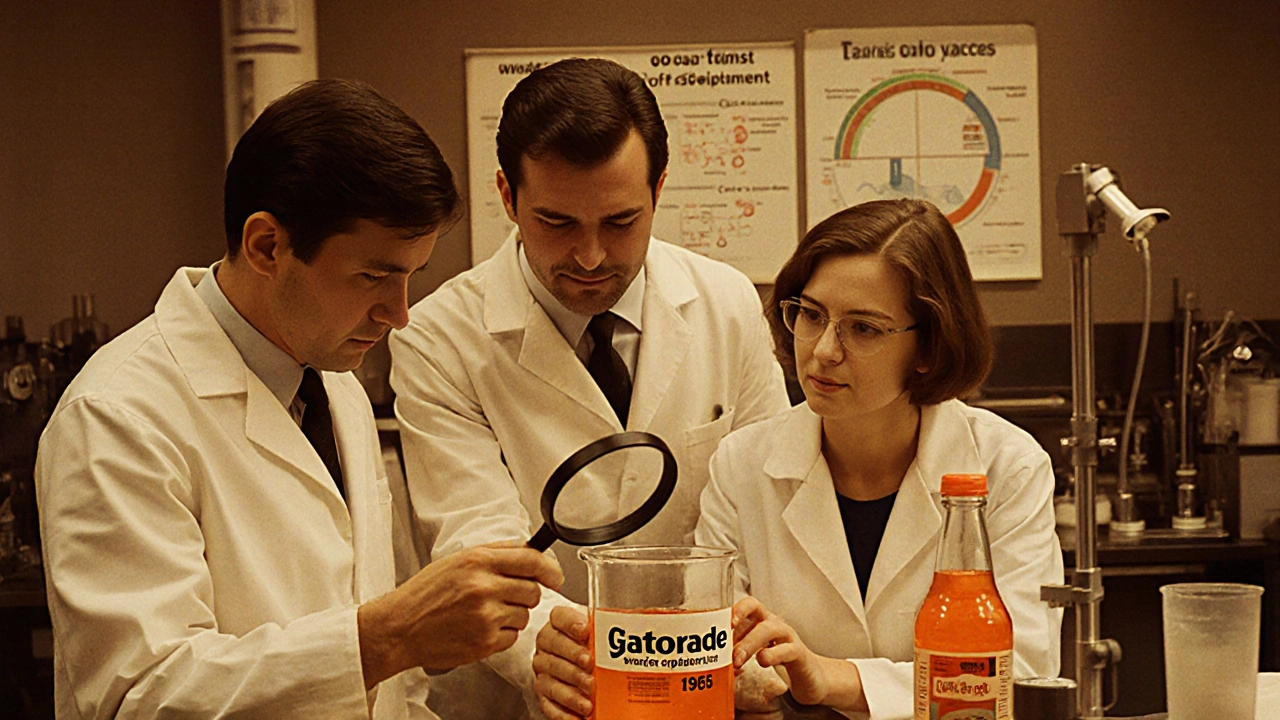
What About Gatorade’s New Products?
Over the years, Gatorade has expanded. There’s Gatorade Endurance (for ultra-endurance athletes), Gatorade Fit (with added protein), and Gatorade Zero (no sugar, no calories). None of these contain caffeine. None of them are energy drinks.
Even Gatorade’s “Thirst Quencher” line - the classic one - doesn’t have caffeine. The company has been clear: Gatorade is a hydration solution, not a stimulant. They’ve even partnered with sports science labs to test their formulas in real athletes. That’s not something energy drink companies do.
There is a Gatorade product with caffeine - Gatorade Energy Shot. But that’s a separate product line. It’s sold in small 2 oz bottles, labeled clearly as an energy shot, and marketed for mental focus, not hydration. It’s not the same as the bottle you see on the sideline.
Bottom Line: It’s Not About the Brand - It’s About the Formula
Gatorade is a sports drink. Not because of its logo. Not because athletes drink it. But because its ingredients are designed to replace fluids, electrolytes, and carbohydrates lost during exercise.
Energy drinks are designed to stimulate your brain and nervous system. They’re not made to hydrate you. They’re not made to replace what you sweat out. And they’re not safe to use as a replacement for water during physical activity.
Confusing the two can lead to poor recovery, unnecessary sugar intake, or even health risks. The next time you pick up a bottle, check the label. Look for sodium and potassium. If it’s there, and there’s no caffeine, it’s a sports drink. If it’s got caffeine, guarana, or taurine - and no real electrolyte balance - it’s an energy drink.
Your body knows the difference. So should you.
Is Gatorade an energy drink because it has sugar?
No. Sugar alone doesn’t make a drink an energy drink. Many sports drinks, including Gatorade, contain sugar to replenish glycogen stores during prolonged exercise. Energy drinks use sugar to mask bitter stimulants like caffeine and to create a quick spike in blood sugar - which often leads to a crash. Gatorade’s sugar is paired with electrolytes and is meant for sustained energy, not stimulation.
Does Gatorade have caffeine?
The original Gatorade Thirst Quencher and most standard versions do not contain caffeine. Some specialty products like Gatorade Energy Shot do, but they are clearly labeled as energy shots and sold separately. Always check the ingredient list - if caffeine isn’t listed, it’s not in the drink.
Can I drink Gatorade instead of water every day?
Not recommended. Gatorade contains sugar and sodium, which are unnecessary if you’re not exercising intensely. Drinking it daily can lead to excess calorie intake, weight gain, and increased sodium levels - which may raise blood pressure over time. Water is the best choice for daily hydration. Save Gatorade for workouts lasting longer than an hour.
Is Gatorade better than water for athletes?
For workouts under 60 minutes, water is just as effective. For longer, more intense sessions - especially in heat - Gatorade helps replace lost electrolytes and provides fuel in the form of carbohydrates. Studies show athletes who use sports drinks during endurance events maintain better performance and recover faster than those who drink only water.
Are there healthier alternatives to Gatorade?
Yes. For casual athletes, coconut water offers natural electrolytes with less sugar. You can also make your own sports drink by mixing water, a pinch of salt, and a splash of orange juice. For low-sugar options, Gatorade Zero or Nuun tablets provide electrolytes without the sugar. Always choose based on your activity level - not marketing.

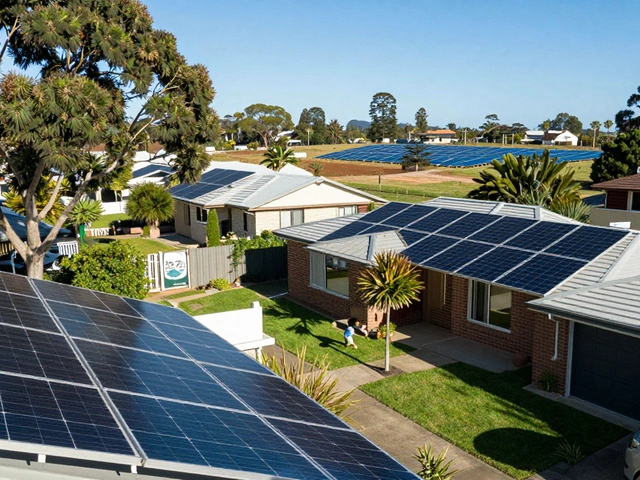


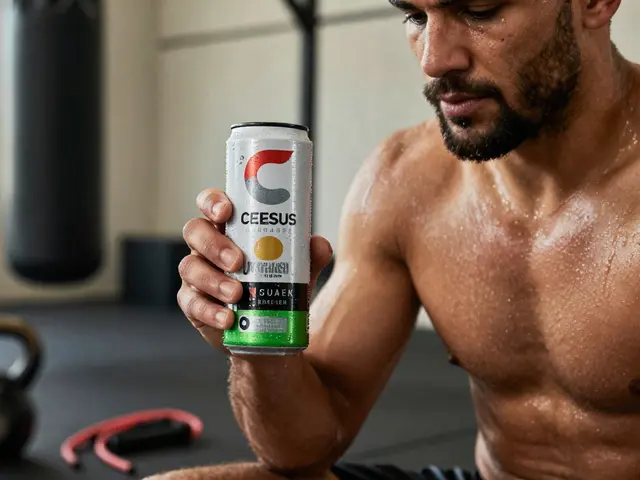

Comments (11)
Anuj Kumar
27 Nov 2025
Gatorade is just Big Pharma’s way to get kids hooked on sugar while pretending it’s healthy. They don’t care if you’re running a marathon or sitting on your couch. They just want your money. And don’t get me started on how they sponsor every school sports team - brainwashing kids into thinking they need this junk to breathe.
Kathy Yip
28 Nov 2025
i’ve always wondered why gatorade tastes so weirdly sweet but doesn’t give me a buzz… now it makes sense. i used to drink it after yoga thinking it was ‘good for me’ but turns out i was just drinking liquid candy. water’s better. thanks for this.
Bridget Kutsche
29 Nov 2025
This is such a clear breakdown! I used to grab Gatorade after every workout until I learned I was just adding unnecessary sugar. Now I only use it after long runs or hot hikes. And for everyday hydration? Water + a pinch of salt if I’m sweating hard. Simple, effective, and cheap. Thanks for the science-backed clarity!
Jack Gifford
30 Nov 2025
Minor correction: the original Gatorade formula had 6% carbs, yes - but it was glucose, not sucrose. Modern versions switched to high-fructose corn syrup for cost, which changes the metabolic impact. Also, sodium isn’t just for cramps - it’s critical for fluid retention. If you’re not replacing sodium, you’re just peeing out the water you drank. And yes, energy drinks are dangerously misused as pre-workout fuel. I’ve seen ER cases from that combo.
Sarah Meadows
1 Dec 2025
Let’s be real - this whole ‘sports drink’ thing is a liberal scam. Real Americans hydrate with water and hard work. Gatorade is just a tool of the elite fitness-industrial complex to make ordinary people feel inadequate. If you can’t run a mile without a sugary chemical cocktail, maybe you shouldn’t be running at all. America doesn’t need hydration gimmicks - we need discipline.
Nathan Pena
2 Dec 2025
While your breakdown is technically accurate, it lacks nuance regarding glycemic load and osmolality. Gatorade’s 6% carbohydrate concentration is deliberately isotonic to optimize gastric emptying - a detail omitted by most lay analyses. Furthermore, the sodium-to-potassium ratio (approximately 4:1) mirrors sweat composition, which is why coconut water - despite popular belief - is inadequate for prolonged exertion due to its elevated potassium and low sodium content. Your ‘healthier alternatives’ section is dangerously reductive.
Mike Marciniak
3 Dec 2025
They don’t tell you this but Gatorade was originally funded by the sugar lobby. The University of Florida didn’t invent it to help athletes - they invented it so Big Sugar could get into the sports market. The whole ‘electrolytes’ thing is a smokescreen. Look at the patent filings. Look at the funding sources. This isn’t science. It’s corporate propaganda dressed in athletic gear.
VIRENDER KAUL
4 Dec 2025
It is a matter of public health concern that the average individual cannot discern between a hydration solution and a stimulant beverage. The proliferation of misinformation regarding Gatorade as an energy drink reflects a broader societal decline in nutritional literacy. One must exercise extreme caution when consuming industrially processed fluids. The body does not require synthetic sugars during sedentary activity. The data is unequivocal.
Mbuyiselwa Cindi
4 Dec 2025
I used to think I needed Gatorade after every gym session… until I started making my own with water, lemon, salt, and a splash of honey. Cheaper, no weird chemicals, and I don’t feel like I swallowed syrup. Also - if you’re not sweating buckets for over an hour, just drink water. Your kidneys will thank you.
Krzysztof Lasocki
5 Dec 2025
So let me get this straight - you’re telling me I’ve been wasting $3 on orange-flavored sugar water because I thought it was ‘fueling’ me? And the real energy drink is the one that makes me feel like my heart’s gonna explode? Wow. I’m not an athlete, I’m a walking billboard for corporate nonsense. Thanks for the reality check… and also for making me feel dumb in the best way.
Henry Kelley
6 Dec 2025
this was super helpful. i always thought gatorade was just for athletes but now i get it - if i’m not sweating for an hour straight, water’s fine. also i didn’t know gatorade zero existed. gonna try that next time i’m out hiking. thanks for keeping it real.